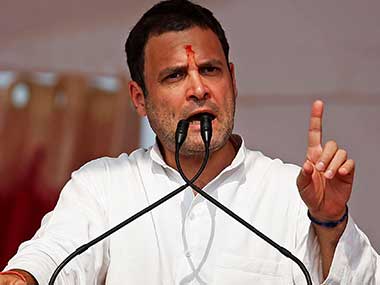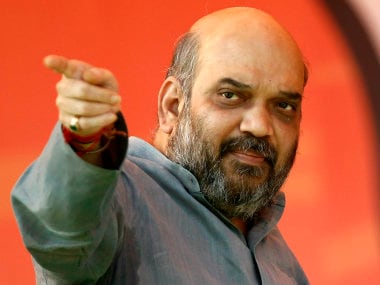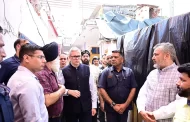Soon after his party’s victories in the recent Assembly elections in Chhattisgarh, Madhya Pradesh and Rajasthan, Congress president Rahul Gandhi sent an unprecedented audio message, according to a report, to almost two and a half lakh party members in the three states. These workers are among those on the ShaktiApp, an internal communication system that directly links registered booth-level workers to the central leadership.
The ShaktiApp is a useful tool to build and energise the base, especially as the Congress party’s on-the-ground structures remain weak.
Rahul reportedly congratulated the workers and asked, “Who should be the chief minister?” He assured the workers that their replies would remain confidential. Rahul’s outreach was not ignored; those approached did respond.
As Rahul has been committed to introducing democratic practices in the party, it could have been expected that Congress spokepersons would take great credit for this consultative process. Far from doing so, the party has made no reference to the exercise. Is this because the recommendations of the workers were ignored? At least, this was so in Chhattisgarh. According to sources who requested anonymity, at least two-thirds of the workers wanted TS Singh Deo to be the chief minister while Gandhi was persuaded by his senior party colleagues to go with an OBC state leader and Bhupesh Baghel took over the coveted office.
Rahul’s consultation exercise raises fundamental issues on its compatibility with the tenets of representative democracy, which forms the basis of Indian polity.

Wide and transparent consultation with party workers in choosing election candidates should become a norm for all parties. If Rahul puts such mechanisms in place in the Congress, he would deserve praise but it seems unlikely that he will do so, for it will go against the patronage system now prevalent — and this applies to all parties — in the distribution of election tickets.
After elections, legislative groups of parties have to pick their leaders. Naturally, the leader of the successful party heads the government. Even now, in the states, legislative groups go through the formality of ‘electing’ their leader who then approaches the governor to stake a claim to form the government. But, as it was demonstrated in the recent elections, the real decisions are taken elsewhere, whereas it is the MLAs who should take the decision, for the government has to be collectively responsible to them. This can apply even to coalition governments.
The Indian political system has morphed to become very different from the basic norm of representative democracy. This process began with the Congress but has spread virtually to all, even cadre-based parties. Parties are now run either by political families or have become the extensions of prominent personalities who command all authority. The fate of all party members lies in their hands and individuals with their own power-bases are not only discouraged but are quashed.
In the initial decades after Independence, there was an element of inner party democracy within the Congress, with many of its chief ministers being authentic mass leaders in their own right. The central leadership seldom thrust its choices on the states where elected MLAs chose their leaders. However, after Indira Gandhi split the Congress, it became her party. Once her sons entered politics, it became a family party. Its leaders became dependent on the family and were chosen by it, and not the elected MLAs. Region and caste-based parties that sprang up in the 1980s and after followed the Congress example.
The BJP is not controlled by members of a family. Its decision-making style has been traditionally more collegial and power and influence more diffused. State units also had greater leeway in decision-making though the popular perception now is that the leadership under Prime Minister Narendra Modi and BJP president Amit Shah has centralised all authority. There is also the factor of the Rashtriya Swayamsevak Sangh (RSS) and BJP interplay.
A democratic polity has to be sustained by a democratic political culture. As political parties are the most significant actors in the system, the primary responsibility for the evolution of healthy democratic practices primarily rests with them. The discharge of this responsibility requires that democratic and transparent conventions are put in place in choosing candidates and in deciding the basic approaches of a party to national issues. This has been established in many representative democracies and there is no reason why it cannot be done in India.
Once elections are held then power should flow upwards and not, as is the situation, downwards, with the chosen representatives virtually reduced to being used for the exercise of lung power.
As party members, MPs and MLAs have to abide by party discipline but representative democracy also demands that they retain a measure of autonomy. This is necessary in the functioning of the legislatures, both in law-making and in holding the executive accountable. The fact that Parliament and state legislatures are no longer fulfilling these basic functions is obvious. This is adversely impacting India’s democratic culture, for no other institutional fix can really fill this shortcoming.
Political parties cannot take the position that their inner working can be exempt from the formal democratic processes. This position is simply not logical but has become an inherent part of India’s political culture.
An example has to be set by the national parties. If they pursue inner party democracy, the regional outfits may have to follow suit. From time to time, the Congress has committed itself to doing so and Rahul Gandhi has made attempts in this direction. The party has not succeeded and is unlikely to do so. The fate of Rahul Gandhi’s outreach to the workers only underlines that fact.
source: Firstpost.com








































